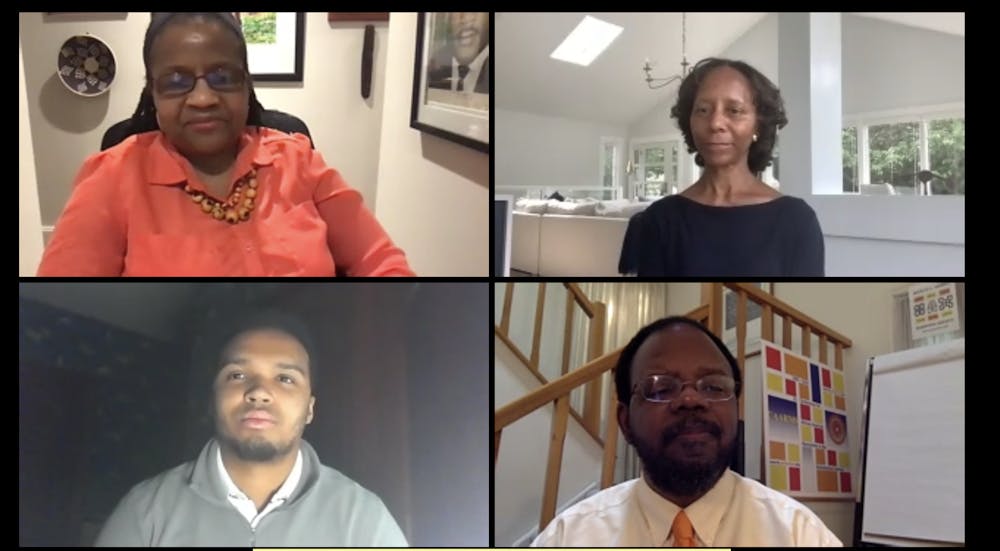Nicholas Johnson ’20, who made history as the University’s first black valedictorian, explored the importance of mentorship for underrepresented minorities at a virtual panel held on Wednesday.
The discussion, titled The Power of Mentors: Blazing Paths for Underrepresented Minorities in STEM, included William Massey ’77, Professor of Operations Research and Financial Engineering, and Dr. Marian Croak ’77, Vice President of Engineering at Google. The conversation was moderated by Kim Pearson ’78, Associate Professor of Journalism at the College of New Jersey and was organized by Ayana Gibbs, media relations specialist at Princeton’s Office of Communications.
During the hour-long event, panelists spoke about differences in mentorship in industry and academia, progress between two generations of black alumni, and the importance of building a community of minority scientists.
Gibbs began the panel by acknowledging “that we are in a crisis — that black people should have agency over their bodies and not be harassed or killed by police.”
“I want to acknowledge George Floyd, Ahmaud Arbery, and Breonna Taylor,” Gibbs said. “Today’s conversation is about amplifying the initiatives of black people doing amazing work in their communities and around the globe.”
Each of the panelists reflected on the current state of racism in the U.S. and the ongoing Black Lives Matter protests that have been occurring worldwide — including in Princeton.
“I’m thrilled to be living through this moment,” said Croak. “The tragic nature of what has spurred this movement is an opportunity for change.”
Johnson in turn emphasized the global nature of the movement. “Here in Canada, we are seeing demonstrations across the country sparked by police brutality both in the United States and around the world,” said the Montreal native.
He stressed the importance “for all people to engage in critical conversations and reflect on how we can best ensure that change can occur.”
Both the facilitator and panelists recognized that one of the most valuable aspects of the panel was its intergenerational perspective.
“When we went to Princeton, it was also such a moment [of change]”, said Croak, with Pearson adding that “we were certainly the beneficiaries of the civil rights movement, but we also had a President forced out of office, an ongoing war, and leaders assassinated.”
“One of the lessons that we learned is that progress doesn’t come from charismatic leaders. Progress comes from the movements and relationships between people,” said Pearson.

According to Johnson, “mentors are invaluable in teaching us to engage with these conversations.”
“I have had the fortune of studying with African American professors at the University like Professor Massey in the Operations Research department. I’ve had both faculty and graduate mentors [from] a few years ahead of me,” said Johnson.
Johnson recently attended the Conference for African American Researchers in Mathematical Sciences (CAARMS), a conference that Massey co-founded, which celebrated its 25th anniversary this year. The young mathematician said he was greatly inspired.
“Seeing and interacting with so many high achieving people, who looked like me, and shared my interests, renewed my passion and drive [for academia],” said Johnson.
In contrast, when Croak and Massey were pursuing degrees at Princeton, there were no African American professors in engineering. Croak, Massey, and Pearson, however, are all alumni of another institution – AT&T Bell Laboratories; their formative experiences with mentorship were in industry.
In 1942, Walter Lincoln Hawkins became the first black engineer at Bell Laboratories. Princeton hired its first black engineering professor, Winston Soboyejo, fifty-seven years later, in 1999.
“Everything I know about mentoring, I learned at Bell Laboratories,” said Massey. “Sometimes I am frustrated with the academic world, because they are still trying to develop diversity programs that Bell Labs had already developed fifty years ago.”
Croak echoed similar experiences at Bell Laboratories, citing both black and non-black mentors that have been pivotal to her career. She has since moved on to Google, where she has led the deployment of Wifi for India’s railway system and directed communication technology for Project Loon, a venture to provide worldwide internet coverage through balloons.
“The one difference is that Google has placed immense focus on community outreach in their diversity programs over the years,” said Croak.
As opposed to industry, where people “cooperate across different backgrounds,” Massey cautioned against a tendency in academia “for people to retreat into their own silos.”
Both Croak and Massey recognized room for improvement when it comes to minority mentorship, with Croak calling for more formalized mentorship programs and Massey saying that “there needs to be peer pressure among black faculty, to congratulate, to commit, to be there to build community.”
“There is a continuum in mentorship,” Massey added. “I always try to point to people who came before me, and people who will come after me like Nicholas. It’s about creating a minority scientific community. And with a community you have more leverage to create institutional change.”
Over 300 people attended the conversation. According to Gibbs, attendees streamed the event from all around the globe, including the US, Canada, New Zealand, Greece, Indonesia, and Africa.








